领导力-Leadership
- 格式:ppt
- 大小:1.83 MB
- 文档页数:88
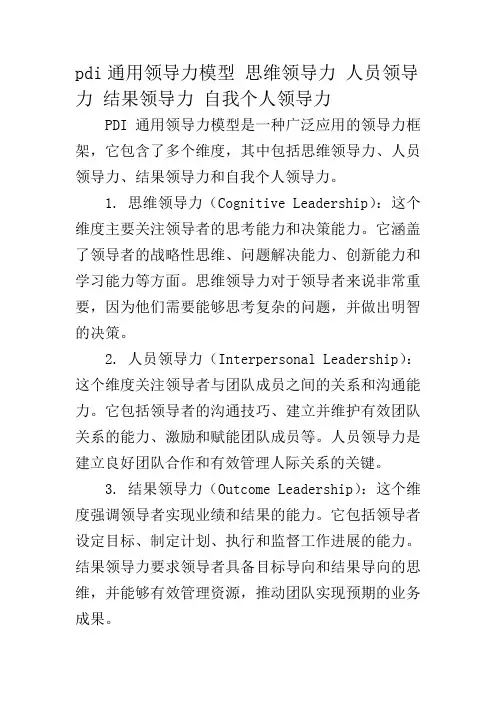
pdi通用领导力模型思维领导力人员领导力结果领导力自我个人领导力
PDI通用领导力模型是一种广泛应用的领导力框架,它包含了多个维度,其中包括思维领导力、人员领导力、结果领导力和自我个人领导力。
1. 思维领导力(Cognitive Leadership):这个维度主要关注领导者的思考能力和决策能力。
它涵盖了领导者的战略性思维、问题解决能力、创新能力和学习能力等方面。
思维领导力对于领导者来说非常重要,因为他们需要能够思考复杂的问题,并做出明智的决策。
2. 人员领导力(Interpersonal Leadership):这个维度关注领导者与团队成员之间的关系和沟通能力。
它包括领导者的沟通技巧、建立并维护有效团队关系的能力、激励和赋能团队成员等。
人员领导力是建立良好团队合作和有效管理人际关系的关键。
3. 结果领导力(Outcome Leadership):这个维度强调领导者实现业绩和结果的能力。
它包括领导者设定目标、制定计划、执行和监督工作进展的能力。
结果领导力要求领导者具备目标导向和结果导向的思维,并能够有效管理资源,推动团队实现预期的业务成果。
4. 自我个人领导力(Self-Leadership):这个维度关注领导者的自我管理和自我发展能力。
它包括领导者的自我认知、自我激励、自我反思和自我提升等方面。
自我个人领导力对于领导者的成功至关重要,因为它涉及到领导者的个人素质、能力和内在驱动力。
这些维度共同构成了PDI通用领导力模型,它提供了一个全面的框架,帮助领导者理解和发展不同方面的领导能力。
通过发展这些领导力维度,领导者可以提高自己的综合领导能力,更好地应对复杂的挑战和变化。

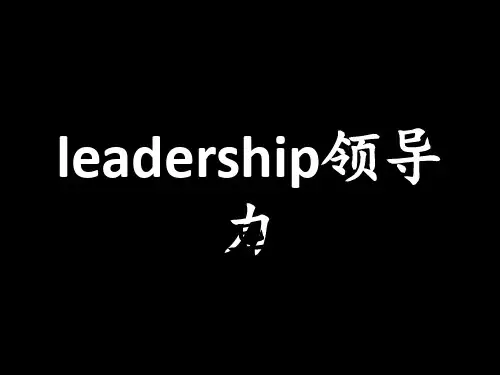


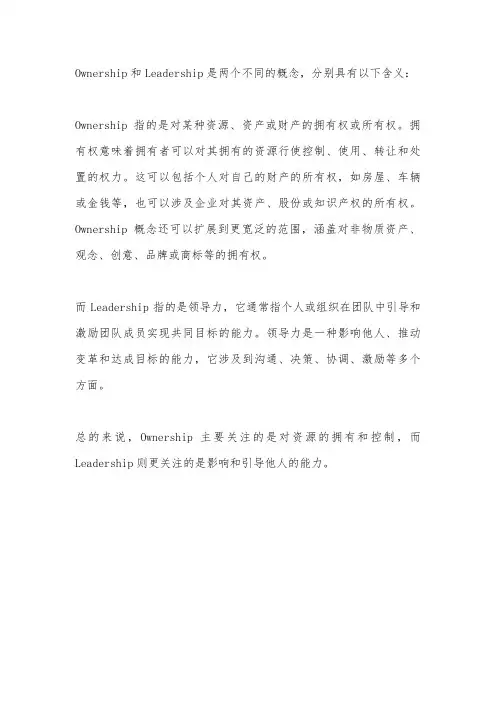
Ownership和Leadership是两个不同的概念,分别具有以下含义:
Ownership指的是对某种资源、资产或财产的拥有权或所有权。
拥有权意味着拥有者可以对其拥有的资源行使控制、使用、转让和处置的权力。
这可以包括个人对自己的财产的所有权,如房屋、车辆或金钱等,也可以涉及企业对其资产、股份或知识产权的所有权。
Ownership概念还可以扩展到更宽泛的范围,涵盖对非物质资产、观念、创意、品牌或商标等的拥有权。
而Leadership指的是领导力,它通常指个人或组织在团队中引导和激励团队成员实现共同目标的能力。
领导力是一种影响他人、推动变革和达成目标的能力,它涉及到沟通、决策、协调、激励等多个方面。
总的来说,Ownership主要关注的是对资源的拥有和控制,而Leadership则更关注的是影响和引导他人的能力。

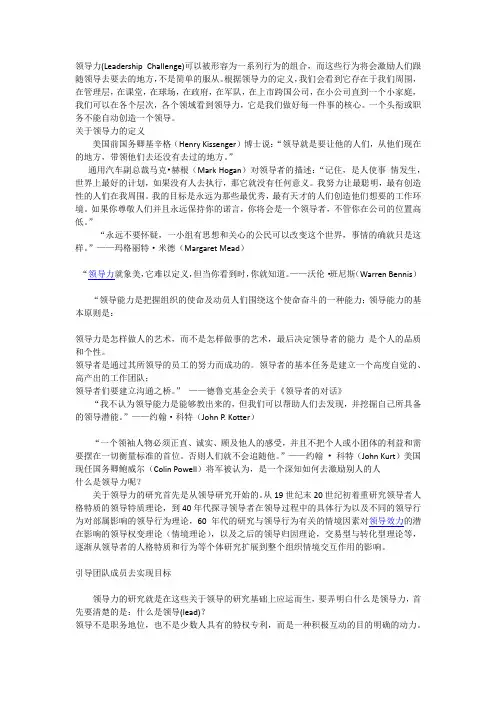
领导力(Leadership Challenge)可以被形容为一系列行为的组合,而这些行为将会激励人们跟随领导去要去的地方,不是简单的服从。
根据领导力的定义,我们会看到它存在于我们周围,在管理层,在课堂,在球场,在政府,在军队,在上市跨国公司,在小公司直到一个小家庭,我们可以在各个层次,各个领域看到领导力,它是我们做好每一件事的核心。
一个头衔或职务不能自动创造一个领导。
关于领导力的定义美国前国务卿基辛格(Henry Kissenger)博士说:“领导就是要让他的人们,从他们现在的地方,带领他们去还没有去过的地方。
”通用汽车副总裁马克•赫根(Mark Hogan)对领导者的描述:“记住,是人使事情发生,世界上最好的计划,如果没有人去执行,那它就没有任何意义。
我努力让最聪明,最有创造性的人们在我周围。
我的目标是永远为那些最优秀,最有天才的人们创造他们想要的工作环境。
如果你尊敬人们并且永远保持你的诺言,你将会是一个领导者,不管你在公司的位置高低。
”“永远不要怀疑,一小组有思想和关心的公民可以改变这个世界,事情的确就只是这样。
”——玛格丽特·米德(Margaret Mead)“领导力就象美,它难以定义,但当你看到时,你就知道。
——沃伦·班尼斯(Warren Bennis)“领导能力是把握组织的使命及动员人们围绕这个使命奋斗的一种能力;领导能力的基本原则是:领导力是怎样做人的艺术,而不是怎样做事的艺术,最后决定领导者的能力是个人的品质和个性。
领导者是通过其所领导的员工的努力而成功的。
领导者的基本任务是建立一个高度自觉的、高产出的工作团队;领导者们要建立沟通之桥。
”——德鲁克基金会关于《领导者的对话》“我不认为领导能力是能够教出来的,但我们可以帮助人们去发现,并挖掘自己所具备的领导潜能。
”——约翰·科特(John P. Kotter)“一个领袖人物必须正直、诚实、顾及他人的感受,并且不把个人或小团体的利益和需要摆在一切衡量标准的首位。
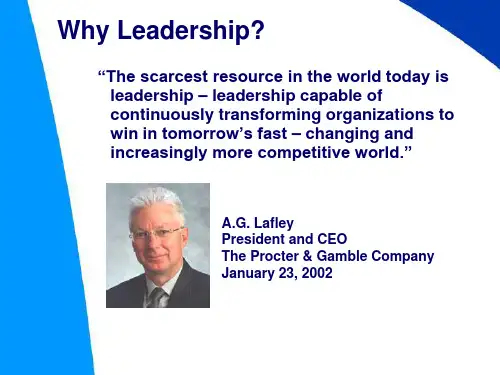
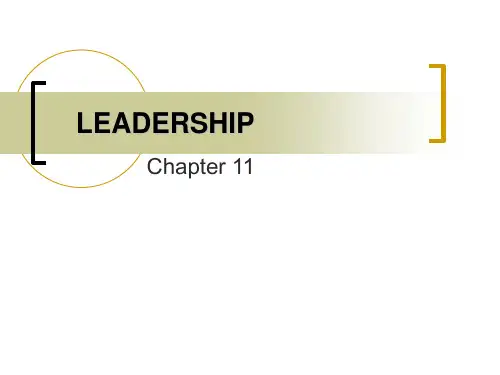
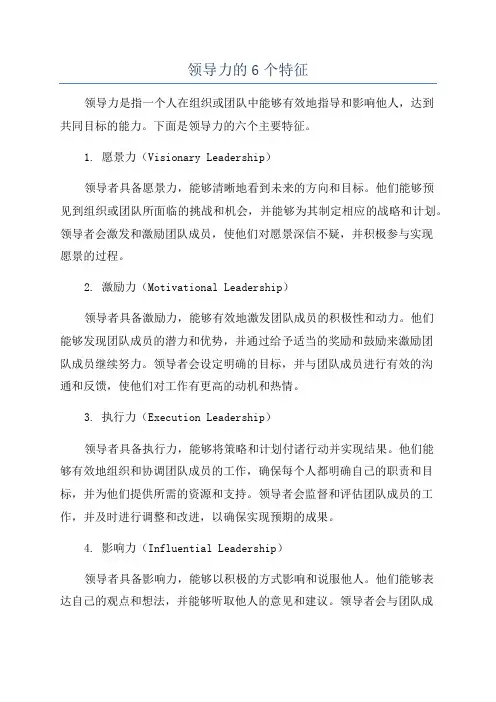
领导力的6个特征领导力是指一个人在组织或团队中能够有效地指导和影响他人,达到共同目标的能力。
下面是领导力的六个主要特征。
1. 愿景力(Visionary Leadership)领导者具备愿景力,能够清晰地看到未来的方向和目标。
他们能够预见到组织或团队所面临的挑战和机会,并能够为其制定相应的战略和计划。
领导者会激发和激励团队成员,使他们对愿景深信不疑,并积极参与实现愿景的过程。
2. 激励力(Motivational Leadership)领导者具备激励力,能够有效地激发团队成员的积极性和动力。
他们能够发现团队成员的潜力和优势,并通过给予适当的奖励和鼓励来激励团队成员继续努力。
领导者会设定明确的目标,并与团队成员进行有效的沟通和反馈,使他们对工作有更高的动机和热情。
3. 执行力(Execution Leadership)领导者具备执行力,能够将策略和计划付诸行动并实现结果。
他们能够有效地组织和协调团队成员的工作,确保每个人都明确自己的职责和目标,并为他们提供所需的资源和支持。
领导者会监督和评估团队成员的工作,并及时进行调整和改进,以确保实现预期的成果。
4. 影响力(Influential Leadership)领导者具备影响力,能够以积极的方式影响和说服他人。
他们能够表达自己的观点和想法,并能够听取他人的意见和建议。
领导者会与团队成员进行有效的沟通和互动,以建立良好的关系和信任。
他们能够以身作则,成为团队成员的榜样,并用自己的言行来影响和激励他人。
5. 人际关系能力(Interpersonal Leadership)领导者具备良好的人际关系能力,能够与不同背景和个性的团队成员进行有效的合作和沟通。
他们能够理解和尊重他人的观点和感受,并能够处理冲突和解决问题。
领导者会倾听团队成员的意见和建议,并给予他们足够的支持和鼓励,以提升团队的整体表现和士气。
6. 适应力(Adaptive Leadership)领导者具备适应力,能够在不同的环境和情境下做出灵活的反应和调整。
什么是领导力如何提高领导力英语作文全文共3篇示例,供读者参考篇1What is Leadership and How to Improve LeadershipIntroductionLeadership is a crucial trait that plays a significant role in the success of individuals and organizations. It involves the ability to inspire, motivate, and guide others towards a common goal. In this essay, we will discuss what leadership is and how one can improve their leadership skills.What is Leadership?Leadership is the ability to influence and guide others towards a common goal. It involves having a clear vision, effective communication, and the ability to motivate and inspire others. A leader is someone who can make tough decisions, take risks, and lead by example. Leadership is not about being in control or giving orders, but rather about empowering others to achieve their full potential.How to Improve Leadership?1. Develop Emotional IntelligenceEmotional intelligence is essential for effective leadership. It involves being self-aware, managing emotions, empathizing with others, and building positive relationships. Leaders with high emotional intelligence can better understand and connect with their team members, leading to improved communication, collaboration, and overall performance.2. Communicate EffectivelyCommunication is key to good leadership. Leaders must be able to clearly articulate their vision, expectations, and goals to their team members. Effective communication involves active listening, asking for feedback, and being open and transparent. By communicating effectively, leaders can build trust, inspire motivation, and foster a positive work environment.3. Lead by ExampleLeading by example is one of the most powerful ways to inspire and motivate others. A leader who demonstrates integrity, honesty, and commitment to their work will earn the respect and trust of their team members. By setting a good example, leaders can inspire their team to do their best and strive for excellence.4. Delegate TasksDelegation is an essential skill for leaders. By assigning tasks to team members based on their skills and strengths, leaders can empower their team to take ownership of their work and develop their skills. Delegating tasks also helps leaders focus on strategic priorities and allows them to leverage the talents of their team members effectively.5. Adapt to ChangeLeaders must be able to adapt to change and navigate uncertain and challenging situations. By being flexible,open-minded, and willing to learn from failures, leaders can lead their team through adversity and drive positive change. Adaptability is essential for leaders to stay relevant, innovative, and responsive to evolving circumstances.ConclusionLeadership is a critical skill that can be developed and improved over time. By developing emotional intelligence, communicating effectively, leading by example, delegating tasks, and adapting to change, individuals can enhance their leadership abilities and achieve greater success in their personal and professional lives. Effective leadership requires continuous learning, growth, and self-reflection to inspire, motivate, and empower others towards a common goal.篇2Leadership is a crucial skill in today's fast-paced and competitive world. It is the ability to inspire and influence others to achieve a common goal. A good leader possess various qualities such as integrity, empathy, communication skills, and decision-making abilities. In this article, we will discuss what leadership is and how to improve one's leadership skills.Firstly, leadership is not just about giving orders and expecting them to be followed. It is about setting a vision, motivating and empowering your team to work towards that vision. A leader should be able to communicate effectively with their team members, understand their needs and concerns, and provide support and guidance when needed.To improve your leadership skills, you can start by developing self-awareness. This means understanding your strengths and weaknesses, as well as how you come across to others. Self-awareness allows you to work on areas that need improvement and capitalize on your strengths.Another important aspect of leadership is emotional intelligence. This involves being aware of your own emotions and those of others, and using that awareness to effectively managerelationships with others. A leader with high emotional intelligence is able to handle conflicts, address issues, and inspire trust and confidence in their team.Furthermore, leadership involves making difficult decisions and taking risks. A good leader is able to weigh the pros and cons of a situation, consider the impact of their decisions, and take calculated risks when necessary. Being decisive and confident in your decision-making is a key aspect of leadership.In addition, effective communication is essential for good leadership. A leader should be able to clearly convey their ideas, expectations, and feedback to their team members. Active listening is also important in leadership, as it allows you to understand the perspectives and concerns of others.Moreover, building strong relationships with your team members is crucial for effective leadership. A leader should be approachable, supportive, and able to build trust and rapport with their team. By fostering a positive and collaborative work environment, you can inspire your team to perform at their best.In conclusion, leadership is a vital skill that can be developed and improved over time. By developing self-awareness, emotional intelligence, decision-making abilities, communication skills, and relationship building skills, you canbecome a more effective and inspiring leader. Remember that leadership is not about power or authority, but about guiding and motivating others towards a common goal. With dedication and practice, anyone can become a great leader.篇3What is Leadership and How to Improve LeadershipIntroduction:Leadership is a critical skill that plays a pivotal role in all aspects of life, including business, politics, education, and personal relationships. A good leader is not only able to guide and inspire others but also has the ability to drive change and make a positive impact on the world. In this essay, we will explore the concept of leadership, discuss the attributes of a good leader, and suggest strategies for improving one's leadership skills.What is leadership:Leadership can be defined as the ability to influence and inspire others towards a common goal. A leader is someone who is able to mobilize a group of individuals to work together towards a shared vision. Leadership is not about bossing others around or exerting control, but rather about empowering andenabling others to reach their full potential. A good leader is compassionate, empathetic, and able to communicate effectively with others.Attributes of a good leader:There are several key attributes that are essential for effective leadership. These include:1. Vision: A good leader has a clear vision of where they want to go and is able to communicate this vision to others. They are able to inspire others to share in their vision and work towards its realization.2. Integrity: A good leader is honest, trustworthy, and has strong moral principles. They lead by example and act with integrity in all their dealings.3. Emotional intelligence: A good leader is able to understand and manage their own emotions, as well as those of others. They are empathetic and able to connect with others on an emotional level.4. Communication skills: A good leader is an effective communicator who is able to convey their ideas and instructions clearly and concisely. They are able to listen actively to others and provide feedback in a constructive manner.5. Decision-making skills: A good leader is able to make tough decisions in a timely manner, based on rational analysis and careful consideration of all available information.How to improve leadership:There are several strategies that can help improve one's leadership skills:1. Self-awareness: The first step to becoming a better leader is to develop self-awareness. This involves reflecting on one's strengths and weaknesses, as well as seeking feedback from others. By understanding oneself better, one can become more effective in leading others.2. Continuous learning: Leadership is a lifelong journey of learning and growth. It is important for leaders to stay updated on the latest trends and developments in their field, as well as to seek out new knowledge and skills.3. Building relationships: Good leaders are able to build strong relationships with others, based on trust and mutual respect. Building relationships requires active listening, empathy, and the ability to connect with others on a personal level.4. Setting goals: A good leader sets clear, achievable goals for themselves and their team. By setting goals and workingtowards them, leaders can motivate others and drive progress towards a shared vision.5. Seeking feedback: Feedback is a valuable tool for improving leadership skills. Leaders should seek feedback from others, including peers, subordinates, and mentors, in order to identify areas for improvement and make necessary changes.Conclusion:In conclusion, leadership is a critical skill that can be developed and improved over time. By developingself-awareness, continuous learning, building relationships, setting goals, and seeking feedback, individuals can become more effective leaders. Good leadership is about inspiring and empowering others to achieve their full potential, and by honing one's leadership skills, one can make a positive impact on the world.。
领导力的词源意义
领导力一词源于英语leadership,leadership由leader(领袖)和-ship(-力)两部分组成,其本义即为“领袖的能力”,即指在组织或社群中发挥领导作用的人的具体能力和行为所组成的系统。
领导力是指在某一领域或组织中,一位或多位个体以其行为、思考和决策方式,引导、激励他人共同实现其共同的目标并接受其对共同任务负责的能力和才干。
领导力一词的中文翻译,一般意义上为“领导才能”,也常常使用“领导能力”这一中文说法表达。
从语言上看,领导力这一词汇的意义属于合成词,由lead(领导)和ership (选手、国家等的后缀)组成,因此,在某种程度上可以说,领导力是应用基本领导特质和技能所获得的能力,其主要作用是实现组织目标并帮助员工成长。
领导能力是一个多层次、多维度的概念,包括诸如领导者的人格特质、行为和动作、思维方式和能力等各个层面。
领导能力是一个和时间和环境相关的动态概念,会随着时间和环境的变化而有所变化。
某一领域或组织中的领导者表现出来的领导力也有所不同,领导者的领导资质、个性特点和环境因素都会影响其在某一领域或组织中的领导能力的发挥。
在现代管理理论中,领导力是重要的管理工具之一,实现企业战略和发展的关键要素之一。
在实际工作中,领导力不仅仅是领导者具备的,员工也同样需要表现领导力,使团队更加整合并发挥更好的绩效。
总之,领导力是指一位或者多位领导者所具备的,在某一领域或组织中协调、激励、决策和指导他人实现共同目标的能力。
它是一个多层次、多维度的概念,可以带动团队或组织向着更好、更高的目标不断进步。
学习“领导力”的概念✧百度翻译Lead & leadership1.LeadBEING AHEAD OR TAKING SOMEONE SOMEWHERE领先;带领某人去某处vt.领导; 引导; 指挥vi.导致; 领导;n. 领导; 榜样;adj.领头的; 最重要的; 领先的2.leadershipn.领导;领导的才能或能力;一群领导者;带路,指引the activity of leadingthe ability to leadthe body of people who lead a groupthe status of a leader3.英文词根•来源《正本清源:什么是领导力?》(作者:唐荣明)领导力,可以说是舶来品,是西方的Leadership。
从leadership词根上讲,leith是“向前(to go forth),”“突破瓶颈(to cross a threshold),”或“蜕变(to die)”的意思。
因此,leadership的本义是勇于向前、突破瓶颈、创造蜕变。
由此可见,西方leadership的定义本体还是突破、提升和蜕变。
这个领导力的定义源于西方文化,因此,与此相关的三大价值观值得注意:1)自我人生观:人人都可以创造自我的人生,每个人是自我的主人,父母、老板、政府等都是为你所用的,他们最好的作用是为你的成功创造一些环境,给予一些帮助。
但人生要靠自己。
2)人生潜力观:每个人都有潜力,每个人都可以突破自我、成就自我,人生的最大意义就是实现自我;3)自我领导力观:人人都可以有领导力,每个人都可以激发自我、成为具有领导力的人,西方文化和教育的宗旨就是挖掘每个人的潜力,让他们实现具有领导力的光辉人生。
在这种价值观的大文化背景下,领导力与每个人都有了密切的关系,具有领导力是人生的追求,也是事业的追求。
在这种文化中,西方领导力的塑造是从出生就开始了:父母很早就会让孩子独立起来,自己行动,有自我思维,有独立的意识;学校一直对孩子的自我意识形成起辅导作用,充分培养孩子的想象力和创造力,使孩子有不同的人生;公司领导会给下属创造环境,提升他们,挖掘他们的潜力;社会上,每个人都可以参政,都可以成为国家总统。